

Law and technology. The recently-enacted Privacy (Cross-border Information) Amendment Act 2010 improves New Zealand’s privacy framework, but also highlights the challenges to privacy caused by the internet.
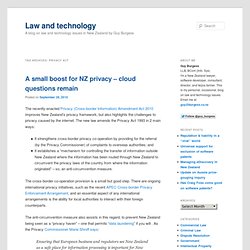
The new law amends the Privacy Act 1993 in 2 main ways: It strengthens cross-border privacy co-operation by providing for the referral (by the Privacy Commissioner) of complaints to overseas authorities; andIt establishes a “mechanism for controlling the transfer of information outside New Zealand where the information has been routed through New Zealand to circumvent the privacy laws of the country from where the information originated” – so, an anti-circumvention measure.
The cross-border co-operation provision is a small but good step. There are ongoing international privacy initiatives, such as the recent APEC Cross-border Privacy Enforcement Arrangement, and an essential aspect of any international arrangements is the ability for local authorities to interact with their foreign counterparts. How Totally Paranoid People Stay Safe Online. A snoop at privacy issueson the internet in New Zealand. Protecting privacy online: The price of reputation. Kiwis warned of online privacy issues - Technology. Internet experts have warned of New Zealanders' carefree attitude to online privacy, saying that most of our personal data is held by foreign companies which are not subject to New Zealand law or ethics.
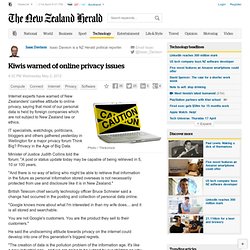
IT specialists, watchdogs, politicians, bloggers and others gathered yesterday in Wellington for a major privacy forum Think Big? Privacy in the Age of Big Data. Minister of Justice Judith Collins told the forum: "A post or status update today may be capable of being retrieved in 5, 10 or 100 years. "And there is no way of telling who might be able to retrieve that information in the future as personal information stored overseas is not necessarily protected from use and disclosure like it is in New Zealand. " British Telecom chief security technology officer Bruce Schneier said a change had occurred in the posting and collection of personal data online. "Google knows more about what I'm interested in than my wife does.... and it is all stored and searchable. You are not Google's customers. Most People Clueless About Online Privacy Protection.
If company privacy policies leave you confused, and you're not even sure where to begin when it comes to controlling your personal information online, you're not alone.
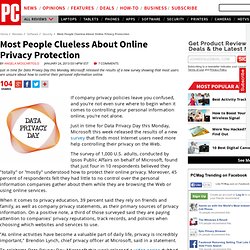
Just in time for Data Privacy Day this Monday, Microsoft this week released the results of a new survey that finds most Internet users need more help controlling their privacy on the Web. The survey of 1,000 U.S. adults, conducted by Ipsos Public Affairs on behalf of Microsoft, found that just four in 10 respondents believed they "totally" or "mostly" understood how to protect their online privacy.
Moreover, 45 percent of respondents felt they had little to no control over the personal information companies gather about them while they are browsing the Web or using online services. When it comes to privacy education, 39 percent said they rely on friends and family, as well as company privacy statements, as their primary sources of privacy information. Online Privacy: Using the Internet Safely. Copyright © 1995 - 2015Privacy Rights Clearinghouse Introduction Introduction As consumers increasingly go online in so many aspects of their daily lives, the challenge is enjoy the conveniences of online activities while limiting the privacy sacrifices.
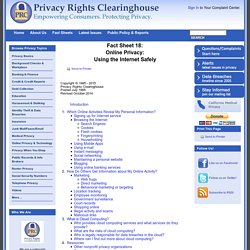
As the focus of online activity migrates from desktop and laptop computers to smartphones and other mobile devices, the mechanisms for protecting your privacy continue to evolve. Most internet users would like to be anonymous online, but many think it is not possible to be completely anonymous online. 4 Internet privacy laws you should know about. Network World - Last year after an outpouring of opposition, Internet advocates logged a victory when they defeated the controversial Stop Online Piracy Act (SOPA).
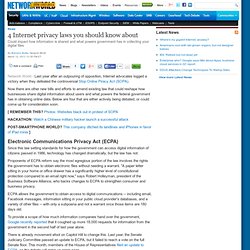
Now there are other new bills and efforts to amend existing law that could reshape how businesses share digital information about users and what powers the federal government has in obtaining online data. Below are four that are either actively being debated, or could come up for consideration soon. [ REMEMBER THIS? Photos: Websites black out in protest of SOPA HACKATHON: Watch a Chinese military hacker launch a successful attack POST-SMARTPHONE WORLD? Electronic Communications Privacy Act (ECPA) Since this law setting standards for how the government can access digital information of citizens passed in 1986, technology has changed dramatically, but the law has not. Proponents of ECPA reform say the most egregious portion of the law involves the rights the government has to obtain electronic files without needing a warrant. The Market for Online Privacy Heats Up.